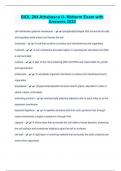Nucleoid region - Study guides, Class notes & Summaries
Looking for the best study guides, study notes and summaries about Nucleoid region? On this page you'll find 366 study documents about Nucleoid region.
All 366 results
Sort by
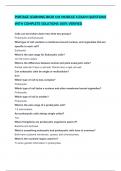 Popular
Popular
-
PORTAGE LEARNING BIOD 101 MODULE 6 EXAM QUESTIONS WITH COMPLETE SOLUTIONS 100% VERIFIED
- Exam (elaborations) • 13 pages • 2024 Popular
-
Available in package deal
-
- $10.99
- 1x sold
- + learn more
PORTAGE LEARNING BIOD 101 MODULE 6 EXAM QUESTIONS WITH COMPLETE SOLUTIONS 100% VERIFIED Cells can be broken down into what two groups? Prokaryotic and Eukaryotic What type of cell contains a membrane bound nucleus, and organelles that are specific to each cell? Eukaryotic What is the size range for Eukaryotic cells? 10-100 micro meters What is the difference between animal and plant eukaryotic cells? Animal cells don't have a cell wall. Plants have a rigid cell wall. Can eukaryotic ce...
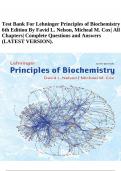
-
Test Bank For Lehninger Principles of Biochemistry 6th Edition By Favid L. Nelson, Micheal M. Cox| All Chapters| Complete Questions and Answers (LATEST VERSION).
- Exam (elaborations) • 273 pages • 2023
- Available in package deal
-
- $24.99
- 2x sold
- + learn more
Test Bank For Lehninger Principles of Biochemistry 6th Edition By Favid L. Nelson, Micheal M. Cox| All Chapters| Complete Questions and Answers (LATEST VERSION). Chapter Chapter 1 1 The Foundations Foundations of of Biochemistry Biochemistry Multiple Choice Questions 1. Cellular foundations Cellular foundations Pages: 33-4 DDiffffiicculttyy: 11 Anns: : CC In a bacterial cell, the DNA is in the: A) cell envelope. B) cell membrane. cell membrane. C) nucleoid. D) nucleus. E) ribosomes. ri...
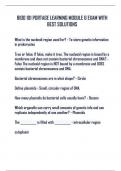
-
BIOD 101 PORTAGE LEARNING MODULE 6 EXAM WITH BEST SOLUTIONS
- Exam (elaborations) • 20 pages • 2024
-
Available in package deal
-
- $21.39
- + learn more
BIOD 101 PORTAGE LEARNING MODULE 6 EXAM WITH BEST SOLUTIONS What is the nucleoid region used for? - To store genetic information in prokaryotes True or false: If false, make it true. The nucleoid region is bound by a membrane and does not contain bacterial chromosomes and DNA? - False The nucleoid region is NOT bound by a membrane and DOES contain bacterial chromosomes and DNA. Bacterial chromosomes are in what shape? - Circle Define plasmids - Small, circular region of DNA. How ...
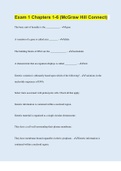
-
Exam 1 Chapters 1-6 (McGraw Hill Connect) | Questions with 100% Correct Answers | Verified | Updated 2023
- Exam (elaborations) • 7 pages • 2023
-
- $7.99
- 1x sold
- + learn more
The basic unit of heredity is the ___________. - gene A variation of a gene is called a(n) _______. - allele The building blocks of DNA are the _____________. - nucleotides A characteristic that an organism displays is called __________. - trait Genetic variation is ultimately based upon which of the following? - variations in the nucleotide sequences of DNA Select traits associated with prokaryotic cells. Check all that apply. Genetic information is contained within a nucleoid region. G...
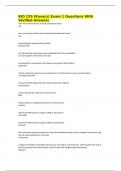
-
BIO 235 (Kovacs) Exam 1 Questions With Verified Answers
- Exam (elaborations) • 15 pages • 2024
-
- $12.04
- + learn more
BIO 235 (Kovacs) Exam 1 Questions With Verified Answers how many chromosomes do most prokaryotes have? one how many copies of their chromosome(s) do prokaryotes have? one what organisms undergo binary fission? bacterial cells why do bacterial chromosomes get replicated before the cell divides? so each daughter cell receives one copy do eukaryotic or prokaryotic cells require more genetic information? eukaryotic what is required in order to pass complements of chrom...

-
Bio 102 exam 1 WVU Salihu Latest Update 100% Pass
- Exam (elaborations) • 10 pages • 2024
-
Available in package deal
-
- $9.99
- + learn more
Bio 102 exam 1 WVU Salihu Latest Update 100% Pass Prokaryote evolution of cells: 3.5 billion years ago Prokaryote size of the cell: small Prokaryote unicellular Prokaryote organelles: absent Prokaryote Location of genetic information: nucleoid region Prokaryote DNA Structure: circular (usually one chromosomes) Prokaryote Reproductive strategy: asexual Prokaryote oxygen requirement: anaerobic (doesn't require oxygen) Eukaryote evolution of first cell: 1.5 billion ye...
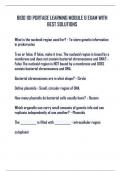
-
BIOD 101 PORTAGE LEARNING MODULE 6 EXAM WITH BEST SOLUTIONS
- Exam (elaborations) • 20 pages • 2024
-
Available in package deal
-
- $20.49
- + learn more
BIOD 101 PORTAGE LEARNING MODULE 6 EXAM WITH BEST SOLUTIONS What is the nucleoid region used for? - To store genetic information in prokaryotes True or false: If false, make it true. The nucleoid region is bound by a membrane and does not contain bacterial chromosomes and DNA? - False The nucleoid region is NOT bound by a membrane and DOES contain bacterial chromosomes and DNA. Bacterial chromosomes are in what shape? - Circle Define plasmids - Small, circular region of DNA. How ...
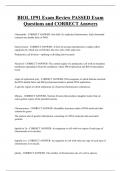
-
BIOL 1P91 Exam Review PASSED Exam Questions and CORRECT Answers
- Exam (elaborations) • 21 pages • 2024
-
- $9.49
- + learn more
BIOL 1P91 Exam Review PASSED Exam Questions and CORRECT Answers Chromatids - CORRECT ANSWER- One half of a replicated chromosome. Each chromatid contains one double helix of DNA. binary fission - CORRECT ANSWER- A form of asexual reproduction in single-celled organisms by which one cell divides into two cells of the same size, Prokaryotic cell division—splitting or dividing into two parts Nucleoid - CORRECT ANSWER- The central region of a prokaryotic cell with no boundary membrane ...
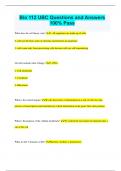
-
Bio 112 UBC Questions and Answers 100% Pass
- Exam (elaborations) • 19 pages • 2024
-
- $10.49
- + learn more
What does the cell theory state? 1. all organisms are made up of cells 2. cells are the basic units of structure and function in organisms 3. cells come only from preexisting cells because cells are self-reproducing All cells include what 4 things? 1. DNA 2. Cell membrane 3. Cytoplasm 4. Ribosomes What is the central dogma? It's the basic flow of information in a cell, it's the two step process of transcription and translation by which information in the genes flow into proteins. What...

Did you know that on average a seller on Stuvia earns $82 per month selling study resources? Hmm, hint, hint. Discover all about earning on Stuvia

